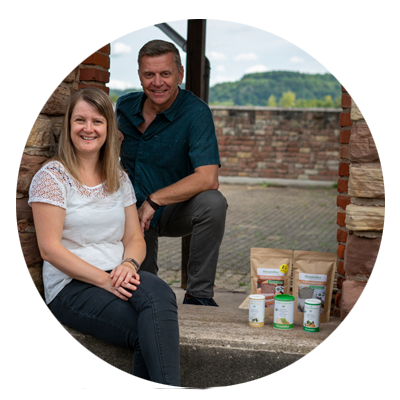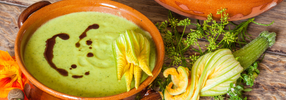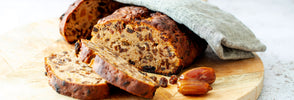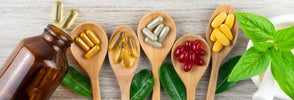
The correct iodine supply for histamine intolerance
Iodine is a vital trace element that not only involves the maintenance of important body functions, but is also crucial for the functionality of our thyroid. If we talk about iodine, we automatically have to take a closer look at the thyroid gland, because up to 80% of the iodine recorded daily is consumed in the thyroid gland ...
In Germany have about 5 out of 100 people a thyroid underactive function, whereby women and the elderly are particularly affected. On one Thyroid hydration suffers 1 out of 100 people and about 10% of the population is from Hashimoto syndrome affected. People with histamine intolerance also suffer from a thyroid thyroid dysfunction and Hashimoto patients strikingly often from histamine intolerance.
Small digression: connection between histamine and thyroid hormones
The mast cells and the thyroid gland influence each other. The exact relationships must be researched even deeper but the following connections are already known (1):
- The intestine is closely related to the thyroid hormones. They play a major role in the intestinal movement. They influence the speed at which the food is digested and transported by the intestine. If the hormone level is reduced, this process slows down and constipation can arise.
- A sick intestine in turn means that the production of the histamine -reducing enzyme dao is reduced or completely set. This is how the histamine level in the intestine increases.
- The thyroid hormone triiodothyronine (T3) and its metabolites are stored in the mast cells. If the mast cells are distributed, itching and inflammation can arise. With the participation of histamine, the sensation of pain is increased.
- An underactive thyroid leads to an increase in mast cells in the tissue and in the thyroid gland.
- Since both histamine (as a tissue hormone) and the thyroid gland are closely linked to the balance of the hormone balance, an imbalance always affects both sides.
- Mast cells have receptors for T3 and TSH ("Thyroidea stimulating hormone"). The TSH hormone stimulates the thyroid gland to form thyroid hormones.
- T3 also increases the histamine concentration in hypothalamus, thalamus and in the cerebral cortex.
- Furthermore, a connection between autoimmune diseases of the thyroid gland (Hashimoto) and increased mast cell activity was found.
Despite Iodine excess - iodine deficiency?
First of all, adequate iodine is very important so that our thyroid gland can work properly. Iodized food and artificial iodized table salt are for a sensible iodine supply not suitable. Since iodine is a trace element, as the name suggests - it is only required in small quantities and can only be processed by the body in small amounts.
But in almost all finished products, iodine is based on the iodine salt used. Whether at the baker in the buns and baked goods, the butcher in the sausage goods and even the user cattle are supplied with iodized feed. This means that milk and meat products contain much more iodine than before (up to 30 times higher). With normal nutrition, iodine needs are exceeded very quickly. It is said that excess iodine is excreted via the intestinal tract, but the healthy process in the gastrointestinal tract is often disturbed, especially in the case of food intolerance.
There is therefore a flooding of the body with artificially obtained potassium iodide in table salt. Due to this surplus, the thyroid gland is quickly overwhelmed and reacts with dysfunctions. The iodine utilization of the thyroid gland is disturbed and despite iodine flooding, people can suffer from a lack of iodine. In Germany, every third is affected and from the age of 45 even every second.
Symptoms of a iodine lack:
- extreme fatigue
- Weakness
- Growth disorders
- Development disorders
- Concentration disorders
- Sensitivity to the cold
- Clear and pressure feeling in the throat
- Breathing difficulties
- Swallowing
- Skin changes
- Depression
- ADHD
- Kopf / Struma
- Underactive thyroid
Causes of a iodine lack:
- The inhibitory medication such as: active ingredient lithium (antidepressants), active ingredient: sulfonamides, aspirin
- High nitrate levels in food due to artificial fertilizers
- Smoking
- Vegan and vegetarian diet
- Gastrointestinal diseases
- Foods containing Goitrogens (2): Kohl, mustard, onions, nuts, garlic
Determine iodine deficiency
An iodine deficiency can be found with your family doctor with a simple blood test. Normal values for the iodine level in thoroughbred are 100-160 µg/l. The thyroid stimulating hormone (TSH) in the serum can also be measured. If there is a defect, the TSH rises in the serum. The normal value is an average of 2 µe/ml. Values of more than 10 µe/ml stand for iodine deficiency. A iodine deficiency at the same time lowers the serum mirror of the overall thyroxine (T4). The normal values are between 4-11 µg/dl. The evaluation of the 24 hours of iodine excretion about the kidneys is also considered a reliable indicator to determine both an iodine deficiency and an oversupply.
Attention: In the event of a defined iodine deficiency, it is important that you definitely supply iodine to your body, since the consequences of the angel of iodine are more serious and the balance in the body's hormonal balance can be severely disturbed, which in turn can deteriorate the histamine intolerance. While taking an iodine preparation, you should eat strictly histamine and make sure that you don't have too much stress to keep symptoms low. Of course, you can also try to compensate for the iodine deficiency (depending on the amount) via the diet. It is best to discuss with your doctor what makes sense for you.
The effect of iodine in the body:
Iodine not only has an impact on the thyroid gland; The trace element still plays an important role for many other functions in our body. It ensures that the normal functions in the body are maintained. The saying: "A lot helps a lot" does not apply to the trace element iodine.
- It is an antioxidant and radical catcher and therefore involved in the immune system.
- It has a positive effect on the fat metabolism.
- It is involved in the body's heat production.
- It contributes to growth and maturation - especially of the brain and bones.
- It plays a role in the energy metabolism, the preservation of normal skin.
- It participates in the function of the nervous system and normal cognitive functions.
Our body cannot produce iodine itself and do not save it. It is therefore important that iodine is supplied from the outside. With histamine intolerance, you should do without food with added iodine, as they are often not compatible. It is therefore best to use food with a natural iodine content.
In the following low -histamine foods, iodine is contained naturally:
- The best in bio quality (salmon, pollachers, red bark, cod, seanight, plaice, trout, pikeperch - test individual compatibility)
- Green leafy vegetables such as lamb's lettuce or endivia.
- Vegetables like mushrooms or broccoli.
There are already 60 - 120 g cod or pollos every day to cover your daily iodine requirement. However, since you consume many other foods with a natural iodine content every day, daily fish consumption would be too much of a good thing. That is why it is enough if you incorporate a smaller portion of sea fish into your menu 2 - 3 times a week to cover your iodine requirement.
More food at a glance (3)
| Lebensmittelgruppe | Jodgehalt (µg/100g) |
|---|---|
| Fische & Meerestiere |
Schellfisch 243 Kabeljau 155 Rotbarsch 104 Lachs 34 |
| Fleisch & Geflügel |
Rindfleisch 5 Gans 4 Kalbfleisch 3 |
| Getreide & Getreideprodukte |
Haferflocken 6 Hirse 3 Mais 3 Reis, Natur 2 |
| Eier & Milchprodukte |
Hühnerei 9–10 Kuhmilch 3–6 Ziegenmilch 4 Gouda 4 Speisequark mager 4 |
| Obst & Gemüse |
Brokkoli 15 Grünkohl 12 Wassermelone 10 Radieschen 8 Preiselbeeren 5 Endivien 5 Kartoffeln gekocht: 4,3–4,6 Möhren 4 Pfirsich roh 3 Weißkohl 3 |
| Salz & Meersalz | Meersalz 18 |
Die Werte unterliegen den bei Naturprodukten üblichen Schwankungen.
Daily requirement for iodine
The German Nutrition Society has determined the following guidelines (4):
- Children between 1 and 10 years: 100 - 140 micrograms per day (depending on age).
- Young people and adults Between 13 and 50 years: 200 micrograms per day
- Adults over 51: 180 micrograms: per day.
- Pregnant woman: 230 micrograms per day
- Still: 260 micrograms per day
Where does it come from the fact that salt is added to iodine?
Germany, like other regions of Europe and North America, is also considered a "iodine deficiency area". For this reason, state iodizing programs were launched that provided the yodelling of food salt by law. Until the "turn", the iodizing of the dining salt in Germany was prescribed by law. In the meantime, however, the use of iodine salt is voluntary. In industry, however, iodine salt has become natural and is indispensable.
In Germany, potassium or sodium iodate is mainly used for saline or sodium iodate for saline. It is dissolved in water and added to the dining salt. The prescribed iodine content is regulated by law and is between 15 and 25 milligrams of iodine per kilogram of dining salt. If you take a look at the above table, you will find that iodized dining salt contains a umpteen in artificial iodine compared to natural iodine-containing foods (iodized dining salt: 1,500-2.500 µg/100 g).
Some scientists emphasize the dangers that could arise due to state iodizing programs for people who suffer from hyperthyroidism or thyroid car immune diseases. You see a connection in the frequency of the disease Hashimoto thyroiditis with increasing iodine intake. Medically speaking, according to other critics in our civilization, there is more the problem of an iodine recycling disorder than an iodine lack.
Collapsible content
Sources
(1) Landucci e, Laurino A, Cinci L, Gencarelli M, Raimondi L. Thyroid Hormone, Thyroid Hormone Metabolites and Mast Cells: A Less Explored issue. Front Cell Neurosci. 2019; 13. DOI: 10.3389/FNCEL.2019,00079 (2) I. Elmadfa, nutritional teaching, 3rd edition Eugen Ulmer Stuttgart, 2015. (3) https://www.eucell.de/ernaehrungenlexikon/spurenelemente/jod/lebersmittel and http://www.vitalstoff-lexikon.de/spurenelemente/jod/feensmittel.html (4) https://www.dge.de/wissenschaft/referenzwerte/jod/?l=0

From those affected for those affected
We are Thomas and Michaela Zinser, founder of Histaminikus.
Because of the own histamine intolerance of Michaela and our son, we founded Histaminikus. The frustration does not find any suitable histamine food has spurred us to develop low -histamine food.
We would like to give you back a piece of quality of life. Feel free to look around with us.
Kind regards
Thomas and Michaela






